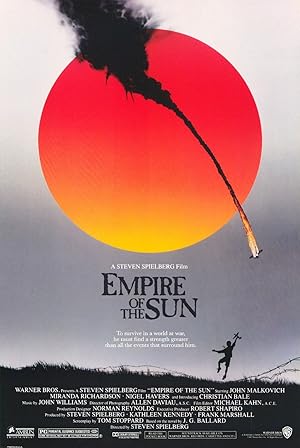Empire of the Sun
| 1987Directed by: Steven Spielberg
Main Plot
Empire of the Sun follows the journey of a young British boy named Jim during World War II in Shanghai. As the war escalates, Jim finds himself separated from his parents and caught in the chaos of the Japanese invasion. He is taken captive and placed in a prison camp, where he struggles to survive amidst the harsh conditions and the brutality of war. Throughout his ordeal, Jim's resilience is tested as he navigates the complexities of his new reality, forming bonds with fellow prisoners and adapting to the challenges of life in captivity. The film explores themes of loss, survival, and the impact of war on innocence, as Jim's experiences shape his understanding of the world around him. Ultimately, his journey is a poignant reflection on the effects of conflict on a young mind and the enduring hope for freedom and reunion.
Characters
- Christian Bale plays Jim "Jamie" Graham, a young British boy who struggles to survive in a Japanese internment camp during World War II.
- John Malkovich plays Basie, an American hustler and opportunist who influences the young protagonist while they are in a Japanese internment camp during World War II.
- Miranda Richardson plays Mrs. Victor, a fellow prisoner in the internment camp who provides companionship and support to the young protagonist, Jim.
Ending Explained
In the ending of Empire of the Sun, the protagonist, Jim, finds himself in a chaotic and devastated post-war environment after the Japanese surrender in World War II. Having been separated from his parents and enduring the harsh realities of a prisoner-of-war camp, Jim's journey culminates in a moment of both loss and hope. As he witnesses the aftermath of the war, he experiences a profound sense of dislocation and confusion, reflecting the broader impact of war on innocence. The climax occurs when Jim, now more resilient, is reunited with the remnants of his former life, including the remnants of his childhood dreams. He encounters a group of British soldiers who are trying to restore order, symbolizing the return of normalcy. The film concludes with Jim being taken to a British camp, where he is finally given the chance to reconnect with his family. This resolution highlights the theme of survival and the enduring spirit of hope amidst devastation. The ending encapsulates Jim's transformation from a naive boy to a more aware individual shaped by his experiences, ultimately emphasizing the resilience of the human spirit in the face of adversity.
